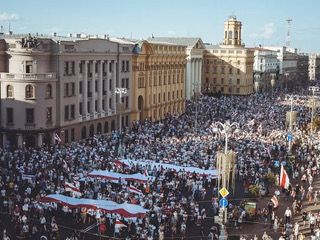You are here:

Photo: Alexander Vasukovich
Kommentar zu den Protesten in Belarus
Andrey Vozyanov, Stadtanthropologe und Alumnus der Graduiertenschule, Minsk am 19. & 20.09.2020 via Facebook
05 October 2020
Motivierend für den Start unserer “Stimmen”-Seite waren die unmittelbaren Berichte von Kollegen und Freunden vor Ort. Ihre Beobachtungen der politische Lage, ihre Berichte über den Verlauf der Protestaktionen, ihre erschütternden Schilderungen über Polizeigewalt und Misshandlungen und ihr Mut, Ängste zu artikulieren und dennoch furchtlos weiter auf die furchtlos weiter auf die Straße zu gehen oder andere Formen des Protests gegen das Lukaschenko- Regime zu finden, haben uns nur bestärkt, ihre und viele andere Stimmen weiter zu übersetzen und zu verbreiten.
Andrey Vozyanov ist einer unserer geschätzten Kollegen vor Ort. Er berichtet seit Beginn der Protest von den Ereignissen, etwa am 12.08. von der Lage in den Gefängnissen. Sein wichtiges Plädoyer einige Wochen später: Der friedliche belarussische Protest des Jahres 2020 hat gewonnen, trotz allem. Nun komme es darauf, präzisere Worte dafür finden, was in Belarus vor sich geht – damit Europa und die Welt in der Lage sind, den bestehenden Begriff des "friedlichen Protests" unmissverständlich und in Respekt gegenüber den mutigen Protestierenden zu verwenden.
***
19.09.20
If there are limits to possibilities of peaceful protest, Belarusian society has definitely reached the point where we should define them.
It is not that Belarusian protesters are ready to take up arms; to the best of my knowledge, they are not. More likely, they'll choose to commit suicide rather than to kill.
Yesterday, Maxim Znak, a well-known advocate and a leading member of the Belarus' Coordination council, started hunger strike in jail after being charged with "seeking to harm national security". Znak felt he had no other way to fight against injustice and arbitrary actions, while in detention.
Despite all heroism of the Znak's decision, the criminal group headed by Lukashenka is unlikely to care even if Belarusians would immolate themselves in hundreds of thousands in front of official buildings. So far, those hundreds of thousands had to change their way of life, sacrifying most of their leisure time for the struggle; volunteering; donating; reducing their consumption radically (there's mass grassroots economic boycott of state produced goods); often rejecting a (relatively easy, still) possibility to escape the country. So many Belarusian families are not living their usual lives anymore; their lives became protest.
These are indicators of mass civic martyrdom outstanding for the region and the moment, "a country of Jesuses" - as a friend of mine from St. Petersburg elegantly (if pathethically) put it.
The peaceful protest - accompanied by various forms of solidarity and self-organization at different levels (from neighborhood communities to Coordination Council) - has won: the regime of Lukashenka has been recognized as illegitimate by the EU and now (yet indirectly but clearly) by the United Nations. Isn't it a victory of peacefully protesting Belarusian people, indeed?
Nevertheless, the criminal (terrorist?) group is still here, not expelled from the country and not jailed for their crimes: depriving people of their freedom without any reason (which is hostage-taking); depriving protesting parents of their parental rights (which is kidnapping of children); punishing people with draconian fines for hanging out a flag or drawing two letters on pavement (which is robbery), and destroying their communal property (which is hooliganism and vandalism).
For Europe, this is a troubling sign: the scale of crime that used to happen at relative distance - in Syria, Venezuela, Sahel, DRK, North Korea etc - is now happening one night train away from Berlin, and two hours by bus from Vilnius, Kyiv, and Warsaw.
The peaceful Belarusian protest of 2020 has won, and from now we must find more precise words for what is going in Belarus - if we want the rest of the world to be able to further use the existing notion of "peaceful protest".
20.09.2020
My birthday wish is that people from all over the world would talk a little bit more about Belarus. I am not coming from this country, but it became my home and I believe it has a lot to say to the world in 2020.
Tell your friends there's hell on earth: where peaceful people are detained and beaten by armed men in balaclavas; witnesses in attendance, without names and faces, tell lies straight into eyes of their innocent compatriots; white is called black and 10 is called 80 on the state TV; and an elk has been hit to death near our forest by a car without numbers; this hell is in Belarus.
Tell your friends there's paradise on earth: where crowds walk along green sunny streets, greeted from balconies, beating into drums, singing songs, sharing food, water, and flowers with each other, standing one for all and all for one; rock stars give concerts in backyards; neighbors let lights and flags into the sky; children plant trees and paint on pavement; everyone cleans up after the gathering and wishes good night in local chat; this paradise is in Belarus.
Tell your friends there must be no God in a country full of Jesuses, where an atheist like me can give a Sunday sermon like this; no one will listen but all will hear, because every day is someone's birthday in Belarus.
***
Person:
Andrey Vozyanov ist Sozialanthropologe. Er hat an der Graduiertenschule für Ost- und Südosteuropastudien der Universität Regensburg promoviert. Derzeit lebt er in Minsk und lehrt an der European Humanities University in Vilnius.
Quelle 1: https://www.facebook.com/andrey.vozyanov/posts/3277322425655794
Quelle 2: https://www.facebook.com/andrey.vozyanov/posts/3279233085464728
back